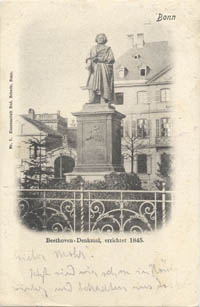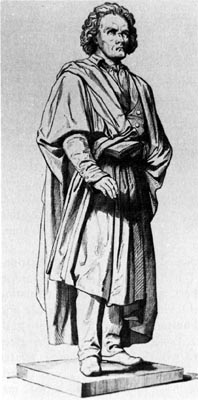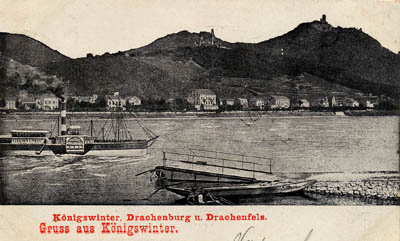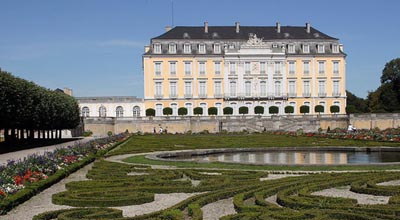
![]()
This page is also available in French
![]()
Berlioz made only one visit to Bonn, in August 1845, and did not perform any of his music there. But the visit to Bonn marked an important moment in his career and prepared the ground for his second major trip to Germany later in the year. Berlioz went there in the first instance to participate in the celebrations organised by Liszt to commemorate the inauguration of a statue of Beethoven in his native city, a project that Liszt had been working on for several years. On 25 April 1841 Liszt had given an all Beethoven concert at the Conservatoire to promote the subscription for the Beethoven monument; the concert was conducted by Berlioz who wrote a report on the concert, but without mentioning his own participation (Journal des Débats, 16 May 1841; Critique musicale IV pp. 503-5). It so happens that Wagner himself was present at that concert, and reported on the part played in it both by Liszt and by Berlioz in an article in the Dresdener Abendzeitung shortly after.
The celebrations in Bonn attracted a large number of musicians and intellectual figures from all over Europe (Italy excepted), many of them personally known to Berlioz, as well as members from Europe’s royal families – the King and Queen of Prussia, Queen Victoria and Prince Albert, and others. Immediately after Berlioz wrote a detailed account of the celebrations which were promptly published in the Journal des Débats (22 August and 3 September); Berlioz subsequently reproduced the report in full in the 2nd Epilogue of the Soirées de l’orchestre (1852). Together with the articles on Beethoven which Berlioz included in 1862 in À Travers Chants, the report forms one of his warmest tributes to the composer he placed above all others and who had revealed to him the potential of instrumental music.
The projected trip to Bonn is first mentioned in a letter to Liszt of 17 May. Liszt, the moving spirit behind the festival, had suggested that Berlioz’s Requiem be performed as part of the celebrations in honour of Beethoven; this delighted Berlioz, though the financial and practical problems involved were an immediate cause of concern (Correspondance générale, no. 962; hereafter CG for short):
[…] I would be delighted to be able to go and conduct my Requiem in Bonn, as you suggest. But I know nothing about the planning for this celebration, the resources available, the freedom you will be given to arrange the programme, when rehearsals will start etc. On all that I am as ignorant as a Bedouin. Are you totally in charge? Are you the organiser of the music festival? I have not received any notification and no hint of an invitation.
The separate parts of my Requiem are not engraved and to have them copied would cost me a fortune […]
If you are in charge, it would be best to obtain from the committee an adequate allowance for my trip; the music would then once again be lent to me, I would bring it to Bonn and it would cost me nothing. As for putting on such a large score, with all its complexities, without me being present, this causes me considerable alarm.
On the other hand I cannot afford the cost of such a trip and the necessary stay in Germany, particularly now that I am looking for the means of going to Russia this coming winter.
But it would be a beautiful occasion; it seems to me that we ought to be together at this celebration, and the honour of singing Beethoven’s Requiem seems to me the highest to which a composer can aspire. […]
A letter to his sister Adèle of 6 June implies that the plan to perform the Requiem did not progress because of the costs involved (CG no. 969):
[…] Liszt wanted to bring me to Bonn for the inauguration of the monument in Beethoven’s honour during the great musical festival which will take place in August. But so far the financial arrangements do not suit me, and I have to agree that gold is a delusion, whatever Scribe may say. […]
In June and July Berlioz went to give concerts in Marseille and Lyon, his first concert ventures in France outside Paris. By the time of his return to Paris his travel plans to Bonn were definite, and Liszt was still suggesting joint concerts with Berlioz to follow the Beethoven celebrations (CG no. 985, 1st August). On 2nd August Berlioz writes to his friend George Hainl, the conductor of the Lyon theatre, who in the event also went to Bonn (CG no. 987):
[…] I am getting ready to depart very soon for Bonn; everyone is going there. It is a veritable migration of artists, men of letters and interested people; I have no idea where we are going to stay. I imagine we will have to set up tents on the banks of the Rhine and sleep in boats. […]
In the end Berlioz did not perform any of his music or participate actively in the celebrations: the musical resources available locally were simply inadequate. Berlioz’s role was instead that of an observer who reported on the celebrations in detail for the Journal des Débats. He left Paris on 7 August (CG no. 989), together with numerous other musical and intellectual figures from Paris, with the intention of arriving on the evening of 9 August (CG no. 988 on August 4, his acceptance of the official invitation which he had only just received). He travelled in the company of his friend Charles Hallé.
As far as we know, no letters of Berlioz survive from the period of the Beethoven festival in Bonn, and only one, written in Frankfurt on 26 August on his way back (CG no. 992, cited in part below), gives a retrospective assessment of the celebrations. The very detailed report he wrote for les Débats is therefore the main source for his view of the occasion. But the report is noticeably selective: apart from the inauguration of Beethoven’s statue it omits mention of all events of a non-musical kind, perhaps deliberately, and does not attempt to give a precise chronology of the sequence of events.![]()
The celebrations started on Sunday 10 August with a concert in the evening conducted by the veteran composer Ludwig Spohr, who had known Beethoven. Held in the specially built Beethoven-Halle, it comprised the Missa Solemnis and the 9th Symphony; a fireworks display followed (not mentioned by Berlioz). There was no concert on the next day (Monday 11 August); instead the guests made a trip by steamer on the Rhine from Bonn to Nonnenwerth, where a banquet was held, after which they returned to Bonn, again by steamer, and in the evening there was a public ball. Berlioz is silent on all the events of this day, and probably did not attend them. The morning of the next day (Tuesday 12 August) the Mass in C was performed at the cathedral (Munster), followed immediately by the ceremony for the inauguration of Beethoven’s statue in the square opposite (the Munsterplatz). In the afternoon came the second concert. Liszt played the Emperor concerto and conducted the 5th Symphony – complete with double-basses in the trio and the repeat in the finale, both regularly omitted in performances in Paris. The rest of the concert was conducted again by Spohr – the Coriolanus overture, an aria from the oratorio Christ on the Mount of Olives, and the quartet and finale from Fidelio. The following day (Wednesday 13 August) a long concert was scheduled for the morning, though its start was delayed to give time for the royals to appear, and when they did the order of the programme was re-arranged to suit their timetable. The concert comprised a cantata by Liszt, which was repeated when the royals eventually arrived, followed by the Egmont overture, a Weber piano concerto, Leonora’s aria from Fidelio, a Mendelssohn aria, and the cantata Adelaide. After the departure of the royals a variety of instrumental and vocal pieces was played, though the audience drifted away before the end – the concert lasted 4 hours in all. A banquet for 550 guests was held afterwards at the Hotel Der Stern, though it is unlikely that Berlioz was present (his report does not mention it). Instead he made his way to a special concert organised by the King of Prussia at the castle of Brühl nearby (he had met the King of Prussia during his visit to Berlin in April 1843 and had been much impressed by his devotion to music). It involved some of finest singers of the day, who happened to be present at the Bonn celebrations, including Staudigl, Pischek, and the celebrated Jenny Lind whom Berlioz heard here for the first time. Meyerbeer accompanied on the piano. The concert ended around midnight and Berlioz returned very late to Bonn by the last train.
After this feast of music Berlioz withdrew for a few days to the tranquillity of Königswinter, a village on the other side of the Rhine opposite Bonn. In a setting once frequented by Beethoven himself, who had left memories among the local villagers, he recollected his experiences and drew up his report (the first page is dated 15 August). It has been persuasively suggested by Adolphe Boschot that it was on this occasion that Berlioz decided to press on with a project that had probably been suggested by his first trip to Germany – to develop his Huit scènes de Faust into the much larger Damnation of Faust (cf. David Cairns, Berlioz, volume 2 [1999], 330f.).
In addition to the two-part report for the Journal des Débats Berlioz had also been asked to write a third report, as he relates in a letter to his sister Nancy from Frankfurt dated 26 August (CG no. 992):
[…] First I had to write three large articles, two for the Journal des Débats and one almost as long as the first two together for a new journal (Le Monde) which will appear in Paris in a few weeks; I was asked by it to give a complete report of all the festivals in Bonn, Cologne, Brühl, Stoltzenfelds, Koblentz, etc. […]
Berlioz may therefore have spent a few days after his stay at Königswinter visiting these other cities before setting off for Paris via Frankfurt. This other report, however, does not appear to have been published (it is not mentioned in the major biographies of Berlioz and is not listed in Holoman’s Catalogue).
The letter to Nancy of 26 August is valuable in giving Berlioz’s private views on the Bonn celebrations; they agree in many ways with his published report, but add a few further comments. To quote from it:
[…] The King of Prussia was most gracious; he recognised me among the crowd of guests at Brühl castle; the princess of Prussia spoke to me for a few moments, but without recognising me, which says little for the charm of my looks, as we had quite a long conversation in Berlin. […]
The gathering of artists and men of letters in Bonn was highly stimulating […] Whatever may have been said, the ceremony was noble in its purpose and in the feelings shared by the assembled gathering. Liszt’s devotion, generosity, and responsibility in performing his role were beyond praise; he played Beethoven’s sublime concerto like all the gods. I am delighted to say that I would have been happy to let you have a fit on this occasion; there you have real music, inspiration, greatness, and poetry! His Cantata is also very fine and I believe it deserves all the praise I lavished on it. He was surrounded by a host of conspiracies, as petty as they were obscure, and that gave him a lot of trouble.
Bonn is a provincial city, and as such full of petty, wicked and stupid ideas, as soon as national or local self-esteem come into play. Unfortunately Liszt had to conduct the orchestra in one of his concerts, which is something that is utterly foreign to him; he conducts like Musard!!! which means that not only does he not conduct, but at times he is an obstacle to the orchestra. Hence the opposition against him on the part of the players, which is actually rather dangerous, as it is based on something real and reasonable.
The Viennese who were here have entertained and pressed me so much to come and visit them that I have accepted; I will therefore set out for Vienna before I go to Russia once I have completed the work I have in hand here. […]
Before setting off for Bonn, Berlioz had actually been planning to make a visit to Bordeaux on his return: the visit to Bonn thus caused him to change his plans. The Viennese Berlioz mentions in his letter will have included Josef Fischoff, Joseph Bacher, and Johann Vesque von Püttlingen: all three actively assisted the visit to Vienna he undertook in the autumn at the start of his second and exceptionally productive trip to Germany.
![]()

This 1901 postcard is from our collection.

This picture appeared in the 9 August 1845 issue of L’Illustration.

This 1903 postcard is from our collection.![]()

This picture is in the public domain.![]()
![]()
* The chronology given here is based on the contemporary account in the Dutch magazine Caecilia of 1845. We are very grateful to our friend Pepijn van Doesburg for providing us with this information.![]()
![]()
The Berlioz in Bonn page was created on 1 August 2005. Revised on 1 February 2024.
© (unless otherwise stated) Michel Austin and Monir Tayeb